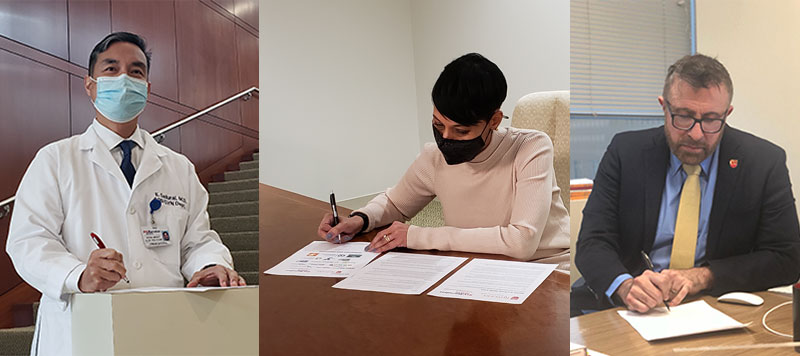
Organizations from across New Jersey have signed on
New Brunswick & Newark, NJ – In recognition of the legacy of Dr. Martin Luther King, Jr. and 402 years of racism in the country, RWJBarnabas Health and the Rutgers School of Public Health join others around the nation to declare that racism is a public health crisis and that Black Lives Matter.
In an effort to ensure a more equitable and just world for Black and brown people, the two organizations developed a call to action in the form of a pledge, which has been adopted by groups that include academia, government, business, and community‐based organizations.
Racism hurts the health of communities by depriving people of the opportunity to attain their highest level of health. It is the fundamental cause of health disparities that are inextricably tied with poverty, inadequate housing, under-resourced and thus, underperforming schools, police brutality, mass incarceration, food deserts, food swamps, unemployment or underemployment, wage disparity, stress, poor access to health care, and violence, all of which are substantial barriers to health equity.
“In order to achieve health equity, eliminate health care disparities, and create more vital communities, we must identify and address racial injustices,” says Perry N. Halkitis, dean of the Rutgers School of Public Health. “We must fearlessly commit to listening, confronting policies, systems, and structures that perpetuate and uphold racism, and holding conversations that lead to actionable change.”
The pledge outlines collaborative steps that organizations must take in order to move towards an antiracists and more equitable world.
Notably, pledge signatories will uplift the voices of people of color to ensure unique perspectives are interwoven into the fabric of our organizations; identify, evaluate, and revise internal processes, practices, policies, and behaviors that fail to promote an antiracist culture; in so doing identify and utilize appropriate tools to help evaluate, measure, and monitor the administrative and clinical decisions, including but not limited to Racial Equity Indices; and leverage our investment assets and capital projects to support the built environment and minority-owned business sustainability in the Black and brown communities in which both facilities reside.
“As anchor institutions within our communities, we must lead the way in addressing racial and social inequities that impact the health and well-being of our diverse communities,” said DeAnna Minus-Vincent, Senior Vice President, Chief Social Integration & Health Equity Strategist for RWJBarnabas Health.
The pledge, which was initially signed by Halkitis, Minus-Vincent and Ernani Sadural, MD, Director of Global Health at RWJBarnabas Health, will also be signed by local organizations that have also expressed a unified commitment to addressing equity and disparities in health care, dismantling systemic racism.
Pledge signatories will work to enlist local organizations committed to fighting social injustices including, but not limited to the New Jersey Institute for Social Justice, Equal Justice U.S.A., New Jersey Citizen Action, and New Jersey Policy Perspective that work to eliminate inappropriate use of force in law enforcement, systemic incarceration of Black males, health care disparities, and economic inequalities in the Black community.
Rutgers School of Public Health
The Rutgers School of Public Health – New Jersey’s leading academic institution in public health – is committed to advancing health and wellbeing and preventing disease throughout New Jersey, the United States, and the world, by preparing students as public health leaders, scholars, and practitioners; conducting public health research and scholarship; engaging collaboratively with communities and populations; and actively advocating for policies, programs, and services through the lens of equity and social justice. Learn how the Rutgers School of Public Health is "keeping the ‘public’ in public health,” by visiting them at Rutgers School of Public Health.
RWJBarnabas Health
RWJBarnabas Health is the largest, most comprehensive academic health care system in New Jersey, with a service area covering nine counties with five million people. The system includes eleven acute care hospitals – Clara Maass Medical Center in Belleville, Community Medical Center in Toms River, Jersey City Medical Center in Jersey City, Monmouth Medical Center in Long Branch, Monmouth Medical Center Southern Campus in Lakewood, Newark Beth Israel Medical Center in Newark, Robert Wood Johnson University Hospital in New Brunswick, Robert Wood Johnson University Hospital Somerset in Somerville, Robert Wood Johnson University Hospital at Hamilton in Hamilton, Robert Wood Johnson University Hospital Rahway in Rahway and Saint Barnabas Medical Center in Livingston, three acute care children’s hospitals and a leading pediatric rehabilitation hospital with a network of outpatient centers, a freestanding 100-bed behavioral health center, two trauma centers, a satellite emergency department, ambulatory care centers, geriatric centers, the state’s largest behavioral health network, comprehensive home care and hospice programs, fitness and wellness centers, retail pharmacy services, affiliated medical groups, multi-site imaging centers and an accountable care organization.
Contact:
Rutgers School of Public Health:
Michelle Edelstein
Mobile: (732) 427-6232
mse46@aph.rutgers.edu
RWJBarnabas Health:
Stacie Newton
Office: (973) 450-2989
Mobile: (201) 424-9678
Stacie.Newton@rwjbh.org